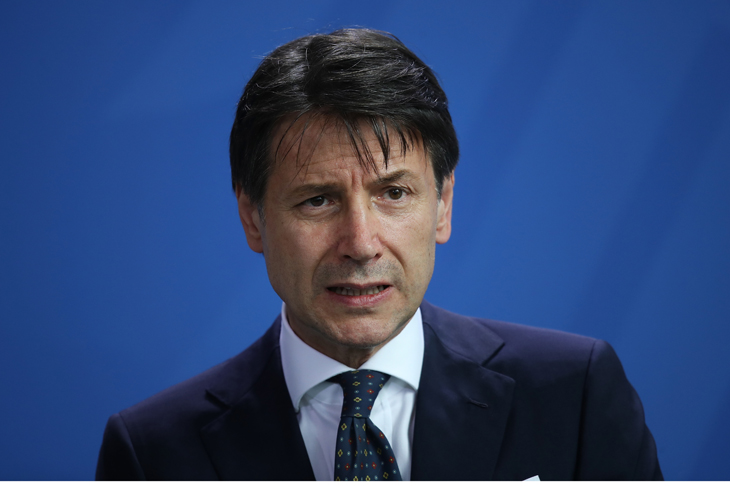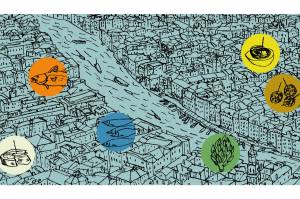For those who believe in the European project, Brexit is a headache. Italy, on the other hand, is a bloody nightmare. Its new anti-elite populist coalition government of the alt-left Five Star Movement and the radical-right League is currently set on a collision course with the EU. This could easily start a chain reaction that destroys the single currency.
The British media hardly mentioned it but on Saturday, once Jean-Claude Juncker, EU Commission president, had sent Theresa May on her way with a pat on the back, he sat down to ‘a working dinner’ with Giuseppe Conte, the Italian Prime Minister, to discuss Italy’s ‘unprecedented’ breach of EU rules on its budget.
In a bid to try to move away from austerity, Italy’s government has proposed a budget which exceeds the EU’s regulations on the amount of spending and debt within the eurozone. There is nothing especially Corbynista, or even Venezuelan, about this budget. The plan is to increase the deficit to a paltry 2.4 percent of GDP. This, among other things, would allow Italy for the first time to provide the dole to citizens who cannot find work.
Yet the EU is not having it, and neither are the markets. Last month, the spread between German and Italian government 10-year bonds — that all-important litmus test in the eurozone — soared into the danger zone well above the 300-point mark (3 percent).
If the spread breaks the 400-point barrier, it could be calamitous. This is what happened in the summer of 2011. It led to a palace coup in the autumn, which was orchestrated in Berlin, Paris, Brussels and Frankfurt. This ousted Silvio Berlusconi, who to this day remains Italy’s last elected prime minister.
In his place, Mario Monti — a former EU commissioner, Goldman Sachs adviser and member of the Bilderberg Group — became the first of five unelected Italian prime ministers in a row. This includes Conte. He is a lawyer, who did not stand in the elections but was drafted in as a compromise leader by the two populist coalition partners, who, let’s not forget, were until recently sworn enemies.
Last week, the EU Commission rejected the populist government’s budget — the first time it has ever rejected a member state’s budget. It gave Italy a month to fall into line or face huge fines of up to 0.5 percent of GDP. Italy’s populist leaders vowed that they would refuse to comply, although this week they have indicated they will consider reducing the deficit target in an attempt to diffuse the row with Brussels. As a result, the spread reduced slightly to just under 300. But Matteo Salvini, deputy prime minister and interior minister, and leader of the League, defiantly warned that the reduction would only be by ‘the odd decimal point’ and the budget document would not be re-written.
Ever since Italy’s populist government came to power, the EU has been on its back. It is an extraordinary sign of just how much sovereignty EU member states, especially those in the eurozone, have ceded to the unelected EU. Just as the Commission has to punish Britain for voting to leave the EU and daring to go it alone, so too must it punish Italy for having a populist government that refuses to dance to its austere Teutonic tune.
In June, when this coalition government was about to be formed, nearly three months after the March general election gave no party or coalition an outright majority, the EU leaned on the Italian President, Sergio Mattarella, to refuse the government’s first choice as finance minister, Paolo Savona. Savona is a perfectly respectable economics professor who has worked for the Bank of Italy, but had made the fatal mistake of once defining the single currency as ‘a German cage’. The message was clear: sorry, but eurozone ministers who criticize monetary union and the Germans are verboten. The fledgling coalition government’s leaders caved in, and instead made Savona Europe minister. Giovanni Tria, who is less outspoken, was appointed as finance minister.
Savona may have been blackballed, but this doesn’t change the fact that both parties in Italy’s coalition were until recently openly hostile towards the euro. But not even the EU can order the Italian President to veto an entire government formed from two parties which together had won 50 percent of the vote. Not yet, at least. Salvini has sported T-shirts proclaiming ‘Basta €uro!’ He has also described the single currency as ‘a crime against humanity’. Last month, he said that ‘people like Juncker… have ruined Europe and our country’. Beppe Grillo, the comedian and demagogue who is an Italian version of Billy Connolly and founded Five Star in 2009, was always ranting on about how fatal the euro had been for Italy.
This hostility— hidden for tactical reasons this past year or so — is increasingly back out in the open. Indeed, as the populist leaders keep hinting, if the EU pushes them too far and even if the markets go berserk, they will not cave in as the Greeks did. Instead, they will launch ‘Plan B’ — a parallel currency to the euro.
Italy’s decision to stand up to the EU has made it a shining beacon of hope for populists throughout Europe who do not want to exit the EU but who want instead to storm to power in Brussels at the European elections next May. They want to work from within to stop ever-closer union and to restore the sovereignty of the nation state.
It also makes Italy’s left-right populist government the antithesis of the French President Emmanuel Macron, who chose the 100th anniversary commemoration of the Armistice in Paris earlier this month to criticize nationalism (whose modern expression is populism) because it erases the thing that a nation ‘holds most precious’, which is ‘its moral values’.
But Macron’s grand program for the dissolution of the nation states of Europe, which he hopes would diffuse nasty nationalism, is surely doomed to fail. This is not thanks to his populist enemies, in Italy or elsewhere, but thanks to his German friends. His plan would oblige Germany to take joint responsibility for the debts not just of Italy but every other eurozone country on the Mediterranean coast. The Germans will never accept this unless it is imposed on them by force.
Last time round, in 2011, what saved Italy from bankruptcy and the eurozone from destruction was nothing to do with who was prime minister but the decision in 2012 by Mario Draghi, the Italian president of the European Central Bank (ECB), reluctantly supported by the Germans, to begin a massive program of printing money to buy up government bonds in eurozone countries, especially Italy (it now holds 15 percent of the total of Italy’s sovereign bonds). The ECB was ready — he announced — to do ‘whatever it takes to preserve the euro. And believe me, it will be enough’. And it was. It was this that brought the spread back down in Italy — and saved the eurozone.
But the ECB plans to stop the program entirely at the end of this year. This will leave Italy utterly at the mercy of the markets, trapped in a dysfunctional monetary union that is not backed by political union, and with eurozone deposit rates already as low as they can possibly go at minus 0.4 percent, and thus quite unable to deal with the next big global economic downturn which many say will strike next year. And unlike Greece, Italy, which is the eurozone’s third-biggest economy, is way too big to save — even if the Germans wanted to.
The problem for Italy is that its economy is a total mess but as a prisoner of the single currency there is little it can do about it. Its GDP is still 5 percent below its peak in 2008. With Greece, it is the only EU country that has failed to recover to the levels of 10 years ago. Italy’s GDP per capita income when adjusted for inflation is lower than it was in 2000.
Italy has one of the lowest fertility rates in the world, at 1.34 children per woman. Its population is aging. Yet one in four Italians aged 15-34 neither work nor study, and youth unemployment is 35 percent (nearly double that in the devastated south). Public debt is at €2.3 trillion, which is 131 percent of GDP, the fifth highest in the world when measured as a proportion of GDP. This debt, two-thirds of which is held by Italians, costs €70 billion in interest payments each year. In October, Moody’s downgraded Italy’s rating to Baa3, its lowest investment grade above junk status.
Italy’s banks have made strenuous efforts to rid themselves of bad loans, which they have reduced from €360 billion (18 percent of loans) in 2015 to €200 billion (11.4 per cent of loans) in 2018. But they are the biggest buyers of government bonds, which locks them and the government into the so-called doom loop. Foreign holders of these bonds have been selling big time – tens of billions of euros worth every month. They are getting the hell out of Italy. Bank share prices have also tanked. Shares in Italy’s two biggest banks, Unicredit and Intesa San-paolo, have lost a third of their value this year. Banca Monte dei Paschi, founded in 1472 and the oldest bank in the world, which had to be bailed out by the government in 2017, has seen its share price reduced by more than 60 percent.
This is a recipe for disaster, which the clash between Italy’s populists and the EU’s imperialists could all too easily set in motion and the damage of which will be far graver than Brexit. When Juncker emerged from his dinner with Conte, the only notable thing he said — and he said it in Italian — was ‘Ti amo Italia’, adding that Italy’s leaders should love the EU more. But fine words butter no parsnips. What Italy needs is a massive shot of financial adrenalin, not protestations of love from a boozy little bon viveur like Juncker.
This article was originally published in The Spectator magazine.


















